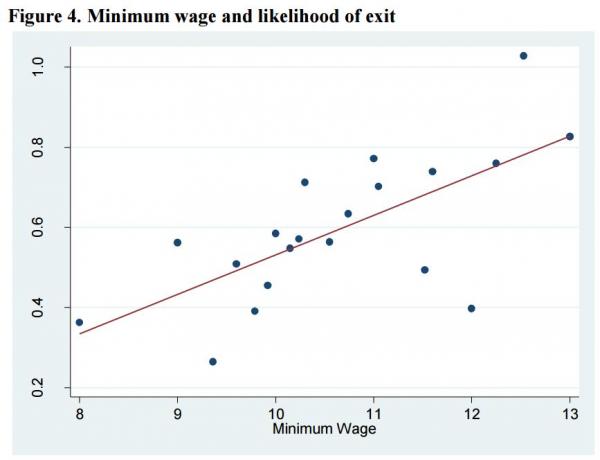
A ‘shocking’ discovery was made when a pair of researchers at Harvard Business School decided to analyze the impact of higher minimum wages in San Francisco on restaurant failures…hint:they went up.
Entitled “Survival of the Fittest: The Impact of the Minimum Wage on Firm Exit“, this latest study on the devastating consequences of minimum wage was conducted by Dara Lee Luca and Michael Luca and concluded that each $1 increase in the minimum wage results in a roughly 4-10% increase in the likelihood of a restaurant going out of business.
In this paper, we investigate the impact of the minimum wage on restaurant closures using data from the San Francisco Bay Area. We find suggestive evidence that an increase in the minimum wage leads to an overall increase in the rate of exit.
This paper presents several new findings. First, we provide suggestive evidence that higher minimum wage increases overall exit rates among restaurants, where a $1 increase in the minimum wage leads to approximately a 4 to 10 percent increase in the likelihood of exit, although statistical significance falls with the inclusion of time-varying county-level characteristics and city-specific time trends. This is qualitatively consistent but smaller than what Aaronson et al. (forthcoming) find; they show that a 10 percent raise in the minimum wage increases firm exit by approximately 24 percent from a base of 5.7 percent. Differences in sample and specifications may account for the differences between our study and theirs.

Moreover, as we’ve pointed out the past, it’s the low-income workers, the ones that minimum wage hikes are intended to help, that end up getting hurt the most when misinformed liberal politicians decide to meddle in labor markets.But, as this new HBS study points out, low-income workers don’t just lose their jobs when minimum wages are hiked…they also lose access to cheap casual dining options as lower-rated, cheaper restaurants are much more likely to fail when their costs are artificially raised.
















